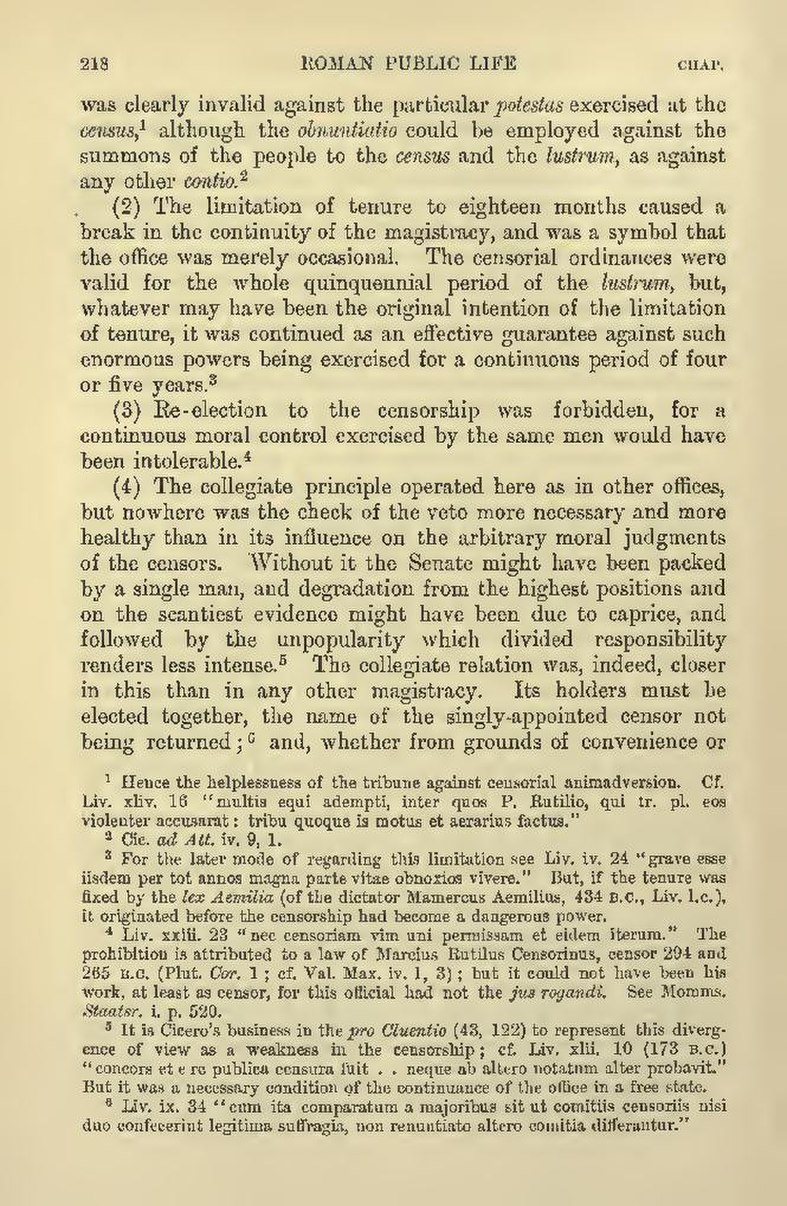was clearly invalid against the particular potestas exercised at the census,[1] although the obnuntiatio could be employed against the summons of the people to the census and the lustrum, as against any other contio.[2]
(2) The limitation of tenure to eighteen months caused a break in the continuity of the magistracy, and was a symbol that the office was merely occasional. The censorial ordinances were valid for the whole quinquennial period of the lustrum, but, whatever may have been the original intention of the limitation of tenure, it was continued as an effective guarantee against such enormous powers being exercised for a continuous period of four or five years.[3]
(3) Re-election to the censorship was forbidden, for a continuous moral control exercised by the same men would have been intolerable.[4]
(4) The collegiate principle operated here as in other offices, but nowhere was the check of the veto more necessary and more healthy than in its influence on the arbitrary moral judgments of the censors. Without it the Senate might have been packed by a single man, and degradation from the highest positions and on the scantiest evidence might have been due to caprice, and followed by the unpopularity which divided responsibility renders less intense.[5] The collegiate relation was, indeed, closer in this than in any other magistracy. Its holders must be elected together, the name of the singly-appointed censor not being returned;[6] and, whether from grounds of convenience or
- ↑ Hence the helplessness of the tribune against censorial animadversion. Cf. Liv. xliv. 16 "multis equi adempti, inter quos P. Rutilio, qui tr. pl. eos violenter accusarat: tribu quoque is motus et aerarius factus."
- ↑ Cic. ad Att. iv. 9, 1.
- ↑ For the later mode of regarding this limitation see Liv. iv. 24 "grave esse iisdem per tot annos magna parte vitae obnoxios vivere." But, if the tenure was fixed by the lex Aemilia (of the dictator Mamercus Aemilius, 434 B.C., Liv. l.c.), it originated before the censorship had become a dangerous power.
- ↑ Liv. xxiii. 23 "nec censoriam vim uni permissam et eidem iterum." The prohibition is attributed to a law of Marcius Rutilus Censorinus, censor 294 and 265 B.C. (Plut. Cor. 1; cf. Val. Max. iv. 1, 3); but it could not have been his work, at least as censor, for this official had not the jus rogandi. See Momms. Staatsr. i. p. 520.
- ↑ It is Cicero's business in the pro Cluentio (43, 122) to represent this divergence of view as a weakness in the censorship; cf. Liv. xlii. 10 (173 B.C.) "concors et e re publica censura fuit . . . neque ab altero notatum alter probavit." But it was a necessary condition of the continuance of the office in a free state.
- ↑ Liv. ix. 34 "cum ita comparatum a majoribus sit ut comitiis censoriis nisi duo confecerint legitima suffragia, non renuntiato altero comitia differantur."
